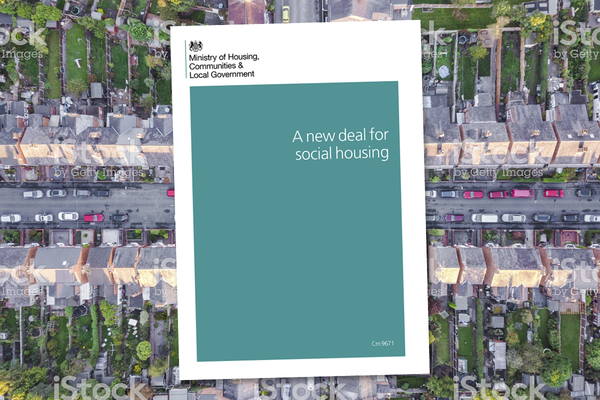League tables could prove ‘blunt’ and ‘counter-productive’, sector warns
League tables of housing associations could prove to be a “blunt instrument” with “counter-productive” effects, sector leaders have warned.
The proposal, featured in this week’s Social Housing Green Paper, would assess landlords against a series of key performance indicators (KPIs).
The idea is set to go out to consultation, but leading sector figures have already criticised the plans.
Geeta Nanda, chief executive of Metropolitan, told Inside Housing that the focus on only certain indicators “could drive the wrong behaviour” in organisations.
“If you have league tables, people will focus on the key indicators which are the external indicators and that does not necessarily drive the best service.
“Post-Grenfell, it has been more important than ever for organisations to focus on engaging with our residents… I don’t know how a league table would show that.”
Paul Hackett, chair of G15 and chief executive of Optivo, said: “I think I worry about anything that is too much of a blunt instrument because we have a very diverse sector with different strategies, different tenant profiles and I think measuring that in a league table will be quite difficult.
“The notion is laudable, it is the actual execution of the idea that I think could be more challenging and I think unless this is done properly it could be quite counter productive.
“Ultimately I would like to see residents given more information about their landlord, to be able to hold their landlord to account. If another landlord down the road is doing a much better job on repairs then why shouldn’t our residents be able to hold us to account on that?”
Ross Fraser, former chief executive of benchmarking organisation Housemark, warned that organisations could ‘game’ their data, especially if performance is linked to grant.
He told Inside Housing: “Unless data collection and validation is approached rigorously, there’s a danger that this will become a crude and cosmetic exercise.”
However, Mr Fraser added that the idea could work if it was carried out as a “genuine partnership between the sector, the government and the regulator”.
Julian Ashby, former chair of the regulation committee, said there “is a logic to having the kind of score cards used by the NHS”, but added that it “would be better” if they were developed by the sector.
He added: “There should be standards against which associations are measured. The purpose is to demonstrate that the sector as a whole is effective – if you are an outlier at the wrong end, then it is uncomfortable, but then so it should be.
“The idea that there should be some measures of performance and these should be published is a much better resolution than just trying to recreate the TSA [Tenant Services Authority].”
Jonathan Walters, deputy director of strategy and performance at the Regulator of Social Housing, said he will work with the sector to decide on appropriate KPIs.
“You can’t just sit in a room and work that out, so we would need to talk to a wide range of stakeholders to make sure we come up with reasonable KPIs.
“Tenant satisfaction is difficult to measure, so coming up with something that really measures it effectively and consistently will be a challenge. That could take a little while to put in place.”
Tracy Harrison, deputy chief executive of the Northern Housing Consortium, said that KPIs that include external factors such as anti-social behaviour in homes sold under the Right to Buy, could unfairly punish associations.
“We are all for transparency, but I think with regards to the league tables it’s one thing if it’s based on indicators that are within their control but it would be very unfair if it is focusing on factors that are beyond their control.
“And for tenants, you live where you live. It’s not that easy to make a decision about your home based on these things.”
Jenny Osbourne, chief executive of Tpas, echoed the point, saying: “While there is undoubtedly an argument for promoting greater transparency across the sector, unless tenants have genuine power and choice to change landlords as a result we are not sure what it achieves from a tenant perspective.”
Social Housing Green Paper: full coverage
All our Social Housing Green Paper coverage in one place:
Green paper measures are not enough to create May’s ‘new generation’ of council homes Green paper proposals are welcome but much more is needed to support councils to build, writes John Bibby
Green paper shows ministers now see associations as trusted partners Focusing on the failure of the green paper to address supply misses the point, writes Boris Worrall
Government should focus on building on what is already strong Philippa Jones considers the Social Housing Green Paper through a slightly different lens
We need more than a week of delayed announcements bundled together Jules Birch reflects on the government’s ‘Housing Week’ announcements
The regulator should monitor how associations assist homeless people Government announcements this week are positive, but any enhanced role for the English regulator should include looking at homelessness prevention work, argues David Bogle
The regulator’s role should be limited to dealing with systemic failures Julian Ashby suggests the Housing Ombudsman Service should deal with all complaints
The green paper shows ministers are in listening mode Despite some glaring omissions, the government appears to be in listening mode and it is important the sector takes advantage, argues Emma Maier
A short history of social housing league tables Attempts to create league tables for housing associations are nothing new. Mervyn Jones looks at how they have worked in the past
League tables could prove blunt and counter-productive, sector warns Housing figures criticise government proposals to measure social landlords against performance indicators
Government ‘must decide how proactive regulator should be’ on consumer standards Ministers now face a dilemma over the regulator’s focus, sector figures say
The Green Paper: a golden opportunity missed? Melanie Rees assesses the Social Housing Green Paper against recommendations drawn up by the Chartered Institute of Housing and finds the government comes up short
Longer strategic partnerships and guranteed debt to boost social housebuilding The Social Housing Green Paper outlines key ways of boosting supply
The green paper is remarkable progress but it is still not enough The green paper suggests the government appears to be re-writing much of its policy since 2010, but more needs to be done, writes Jules Birch
Green paper marks a ‘milestone’ on resident involvement The government’s recognition residents need clear information is to be welcomed, now it up to the sector to embrace tenant involvement, writes Paul Hackett
Ministers consider stock transfer programme to community-led associations The stock transfer programme could be revived under proposals in the housing green paper
Access to housing grant could be tied to new league tables Grant could be awarded according to how well landlords meet performance indicators, the paper suggests
Ofsted-style regulation of tenant services proposed The government is considering expanding the Regulator for Social Housing’s remit to intervene over tenant services and give it a more “proactive approach to enforcement”
Government proposes dropping one-for-one Right to Buy replacement commitment A consultation paper published alongside the green paper proposes a broader measurement to replace the one-for-one pledge
A list of recent housing policy U-turns The green paper confirms yet more housing policy U-turns from the government, which has spent the past two years dropping policy ideas developed under the David Cameron government. Here is a rundown of the major changes in policy direction
Sector welcomes green paper but calls for more ‘ambitious investment’ Reaction to the proposals, from the National Housing Federation, Chartered Institute of Housing and more
Morning Briefing: reaction to green paper announcements how the media reported the proposals trailed by the government overnight
Government drops plans to force councils to sell higher-value stock The government drops plans to force councils to sell higher value homes
League tables and ‘sharper teeth’ for regulator in social housing green paper Ministers reveal some of the things in the paper ahead of its publication
Grenfell survivors: green paper does not go far enough survivors of the Grenfell Tower fire have said the measures published in the Social Housing Green Paper do not do enough to rectify issues in the social housing sector
KEY PROPOSALS IN THE SOCIAL HOUSING GREEN PAPER
- New 'league tables' of housing providers based on key performance indicators, surrounding services such as repairs and neighbourhood management. This could be linked to housing grant.
- Consideration to scrapping of the current 'serious detriment' test, to allow 'Ofsted-style' tougher consumer regulation
- New home ownership options such as allowing tenants to buy as little as 1% of their property each year through shared ownership. This would only apply to new shared ownership purchases.
- Ditching of plans to force social landlords to offer fixed term tenancies rather than lifetime tenancies in social housing
- Ditching of plans to force councils to sell off their most valuable social housing when it becomes vacant
- The potential introduction a new stock transfer programme from councils to 'community-led' housing associations
- The return of guaranteed debt funding to help the development of affordable homes, and longer term 'strategic partnerships' for developing housing associations













